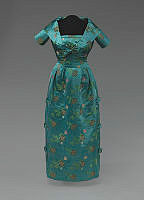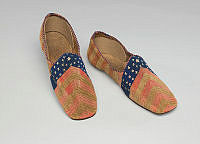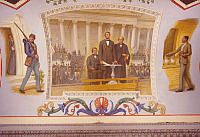Rubenstein Center Scholarship
Blind Piano Prodigy Thomas Greene Bethune
The first African American artist to perform at the White House
Eleven-year-old piano prodigy and composer Thomas Greene Wiggins Bethune (1849-1908) is believed to have been the first African American artist to perform at the White House when he played for President James Buchanan in 1860. By that time "Blind Tom"—as the unsighted enslaved child was billed professionally by his white master-manager Colonel James Bethune—had toured the United States and was a national musical sensation. Those at the command performance in the Executive Mansion were also amazed that such moving and masterful music flowed from someone who was young and disabled (Tom suffered apparent mental deficiencies as well as blindness)—and also a "Negro." In an era when even many abolitionist whites presumed all blacks to be an inherently inferior race, one newspaper critic in attendance reported that Blind Tom's musical skills surpassed Mozart's.

Photograph of blind piano prodigy Thomas Greene Bethune "Blind Tom", the first African American artist to perform at the White House.
National Portrait GalleryBorn in antebellum Georgia to an enslaved couple named Wiggins, Tom, who in infancy showed an uncanny ability to mimic sounds of nature, as a toddler first showed his musical genius in the Bethune plantation house where his mother labored. One day after listening to the Bethune children's piano lessons, Tom himself took the keyboard and astounded the family by reproducing their notes from memory. Soon the slave boy was allowed to improvise on his master's piano and, taught some basics by awed instructors, was creating his own original musical compositions.
Exploitation of Blind Tom's musical genius emerged early and proved a major theme of the pianist's five-decade career. After discovering in an 1857 experiment how his enslaved child prodigy could fill a rented auditorium with enthusiastic paying audiences, Colonel Bethune soon was regularly "hiring out" Tom to various concert promoters who booked Blind Tom in hundreds of packed halls from coast to coast. Predictably, while the white businessmen made handsome profits—even riches--the African American star attraction for his grueling performances got little more than room and board. Long after the 1865 abolition of slavery, the adult pianist, now also thrilling audiences in Europe, remained largely in thrall of his white managers, one of whom had the courts declare the moneymaking Blind Tom his "idiot" ward.
Perhaps the greatest injustice of Blind Tom's career was that, given the racism of the times, few if any of his myriad white fans—not even Mark Twain who once caught Tom's act three nights in a row—considered the African American musician as truly possessing any musical talent, much less genius, of his own. Instead, white audiences typically explained that, since a black person was inherently incapable of such artistry, the spectacular music pouring from Blind Tom's fingertips did not originate inside Tom, but instead came from some supernatural source outside Tom whose black body was merely the music's borrowed "vessel."





















